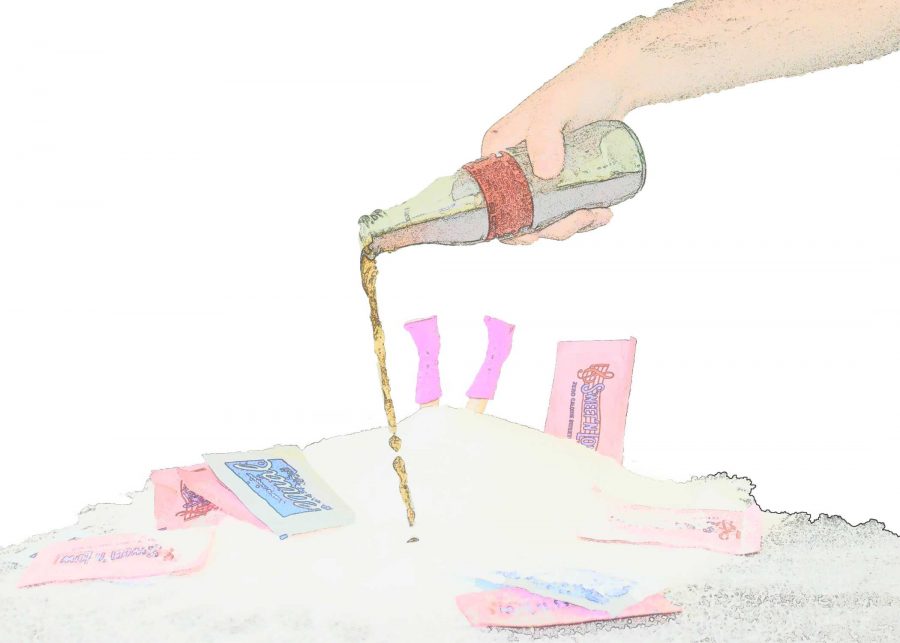We see them at every coffee shop, dinner table, and grocery aisle: brightly colored packets competing for our attention. Splenda, Equal, Sweet’N Low. Yellow, blue, pink.
Researchers have examined how these packets affect our health, and although they seem innocent, some feel these artificial sweeteners are causing serious harm.
Some groups, such as the Center for Science in the Public Interest, blame the rise in obesity, diabetes and cancer on artificial sugar. Others, like the Food and Drug Administration, claim artificial sweeteners are safe.
At Harvard-Westlake, 82% of students who responded to a Nov. 22 survey said that they have been told not to eat artificial sugar, but are unaware of what the real risks are.
“I feel like [artificial sweeteners] are the kind of thing people tell you are bad, but you don’t really know,” Haunani Bautista ’17 said.
In a culture hyper-focused on health, where the words “artificial sugar” can be synonymous with cancer, it can be difficult to separate the truth from the fear-mongering.
But for Elizabeth Litchman ’17, it is actually quite easy. She tries to avoid eating artificial sugars, she said. But she is unable to remember any scientific data or facts that led her to make this decision.
“My mom always told me that it was really bad for you, like with cancer,” Litchman said. “I don’t remember really ever reading [that artificial sugars cause cancer] anywhere. Also I feel like there are so many chemicals in it and it is really unnatural.”
UCLA biochemistry and nutrition researcher Karina Wiesenthal (Izzy ’17, Abby ’21) supports Litchman’s health concerns regarding artificial sweeteners.
In her blog, Do Good Kitchen, she strongly advises against consuming artificial sweeteners such as aspartame and saccharine. They increase one’s craving for sugar, resulting in diabetes and obesity, Wiesenthal said.
“Your reception, your taste buds, when you get glucose, you get satisfaction,” Wiesenthal said. “It binds to your receptors. But [artificial sweeteners] lead to more cravings. You don’t get satisfaction; you want more.”
Wiesenthal claims artificial sweeteners themselves cause neurological diseases and increase susceptibility for brain cancer.
“It does not break down in your body; it does not get eliminated,” Wiesenthal said. “It creates more toxins and is bad for your brain and your neurosystem.”
Wiesenthal points to several studies that back up her claims. She cites a study reported by the Aspartame Toxicity Information Center in 2002, which surveyed 551 people who reported toxicity effects from aspartame ingestion. Consumers reported a number of problems, including neurological or metabolic ones. The report concluded that aspartame often results in toxic reactions when ingested, and that many suffer from effects that they do not realize are linked to aspartame.
The center states in their Report on Aspartame Toxicity Effects, “When one considers that the damage from aspartame is often silent and cumulative (much like chain-smoking cigarettes), one can see that a couple of generations of aspartame use might be disastrous!”
People such as Litchman, who choose not to eat artificial sugar, might be thinking of studies like this when they claim artificial sweeteners cause brain cancer.
However, these claims can lead to false information, as no causation between aspartame and cancer has ever been scientifically proven.
But by linking cancer to the sweeteners, these studies make it difficult to separate the two. In fact, the FDA concluded that artificial sweeteners have no causation with cancer, and that they are indeed safe.
But although sweeteners are FDA approved, consumers are still concerned with potential risks.
Pediatrician Young Nam-Choi warns her patients to avoid artificial sweeteners, drink water instead of diet soda, and eat fruits, which have lots of natural sugar.
“The sweeteners have been around only for the last two decades, and we don’t know the long-term risks yet,” Nam-Choi said. “Also those studies which proved the sweeteners were safe used smaller amounts sweeteners than what people are consuming now, and we have no data on safety of large amounts of these chemicals.”
Nam-Choi agrees with Wiesenthal that artificial sugars cause an increase in craving for real sugar, often resulting in obesity and diabetes. However, she thinks that artificial sugars have no relation at all to cancer.
But just because there are no scientifically proven health harms of artificial sweeteners, consumers should not conclude that they are safe to consume in excess, Nam-Choi said.
Other studies, including a study by Eran Elinav, head of the Weizmann Institute of Science, have already succeeded in proving that sweeteners can cause obesity and diabetes in mice, although they have not concluded that they have the same effects in humans.
Although artificial sweeteners have not been proven to be directly harmful yet, Litchman is still wary.


































